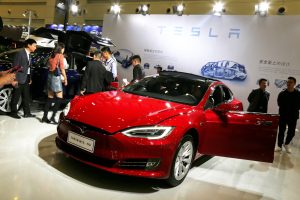The Indonesian government announced earlier this month that it expects Tesla to make a sizeable investment in the archipelago’s electric vehicle (EV) industry “within months,” a major coup for President Joko “Jokowi” Widodo as he nears the end of his second and final term in office.
Although the scope of the deal is unclear, Indonesia’s Coordinating Minister Luhut Pandjaitan has confirmed that Tesla CEO Elon Musk is targeting the domestic manufacture of lithium batteries.
Musk will no doubt want to make use of Indonesia’s extensive nickel reserves, which accounted for nearly half of the world’s supply in 2022.
I remember all too well when representing the U.K. government at COP24 2018 in Katowice, Poland, that promoting EV technology is a time-consuming process. It is greatly to Indonesia’s credit that it has doubled down on state-private sector collaboration.
The archipelago nation’s vast mineral resources and now globally competitive state-owned enterprises certainly make it a good bet to capture a sizeable and lasting share of the EV market, even in the face of stiff competition from budding rivals like India and Thailand.
As such, Indonesia merits more attention than it has received thus far in the U.S. and European policy tilts to the Asia-Pacific. Diplomatic engagement with the Jokowi government (and his potential successors) should therefore intensify, especially for those nations intent on reaping the economic benefits of the green transition.
While Indonesia’s election, slated for next February, is set to be fiercely contested, there is a consensus that Jokowi’s centerpiece “downstreaming” policy should stand the test of time.
Although trialed in fits and starts over the past 15 years, Indonesia’s banning and taxing of exports of critical raw materials like nickel since 2020 has been a quantifiable success, quite to the surprise of pro-market commentators like myself.
In the past three years, revenues from the nickel industry alone have soared from $1 billion to $33 billion, while direct investments from manufacturers Ford, Hyundai, and LG in EV battery (EVB) production are evidence that Widodo has successfully shifted the economy’s modus operandi from the export of raw materials to their development into high-value products at home.
State-Owned Enterprises Minister and close Jokowi ally Erick Thohir recently encapsulated the president’s agenda when he argued that Indonesia’s “tremendous natural resources” have provided the foundation for Indonesia to become a “key player” in the EV space. And the word tremendous is no overstatement.
By 2027, experts forecast that 80 percent of the nickel contained in EV batteries will come from Indonesia. The archipelago’s production of cobalt – another mineral of significant importance to the EVB manufacturing process – quadrupled last year.
Indonesia’s EV ascendancy, however, has not been entirely smooth.
President Joe Biden’s Inflation Reduction Act, enacted this time last year, made available hundreds of billions of dollars’ worth of subsidies for green technology.
And yet when it comes to EVs, the act stipulates that companies can only access the cash if at least 40 percent of the materials that make up their EV battery products are from the U.S., or from a country that the U.S. is bound to via a free trade agreement (FTA).
To mitigate this challenge, Indonesia is now seeking a limited FTA with the U.S., which the Biden administration seems open to. The archipelago’s abundance of “green” metals like nickel, aluminum, cobalt, and copper will strengthen its hand in negotiations.
This mineral wealth also represents just one aspect of Indonesian firepower in the lucrative EV market; the country’s prodigious state-owned enterprises are the second ace up its sleeve.
State enterprises manage over 53 percent of the Indonesian economy and have played a central role in implementing Jokowi’s downstreaming, and more specifically EV-related, policies.
Led by the aforementioned Erick Thohir since 2019, Indonesian SOEs have built numerous nickel smelters (see PT Freeport and PT Timah), developed EV battery technology (Indonesia Battery Cooperation), and rolled out EV-specific infrastructure (Pertamina and PLN).
State-owned banks like BNI, BRI, and Mandiri have also been central to financing these efforts.
Such instances of state intervention are often deplored by international institutions like the International Monetary Fund and there’s little doubt that government-led industrial policies have a strong historical link with economic inefficiency.
That said, for good or ill, the direction of travel in global policymaking is towards statism and Indonesia is therefore fortunate to have shrewd policymakers at the helm of its EV industry. Further, the country’s state capitalist model continues to confound expectations at the macro level: GDP growth registered at over 5 percent this month, while inflation stands at an enviable 3 percent.
With Indonesia bucking stagflationary trends and serving as the cornerstone of the green metal market, Western leaders would be wise to pay it a great deal more attention – as China has done over the past decade.
The archipelago will soon go to the polls and pro-Jokowi, pro-downstreaming figures like Thohir, Luhut, and presidential frontrunner Prabowo Subianto are poised to remain in positions of influence post-2024.
Indonesia’s protectionism may rankle, but it’s worth putting up with to keep the budding economic superpower firmly on side.

































